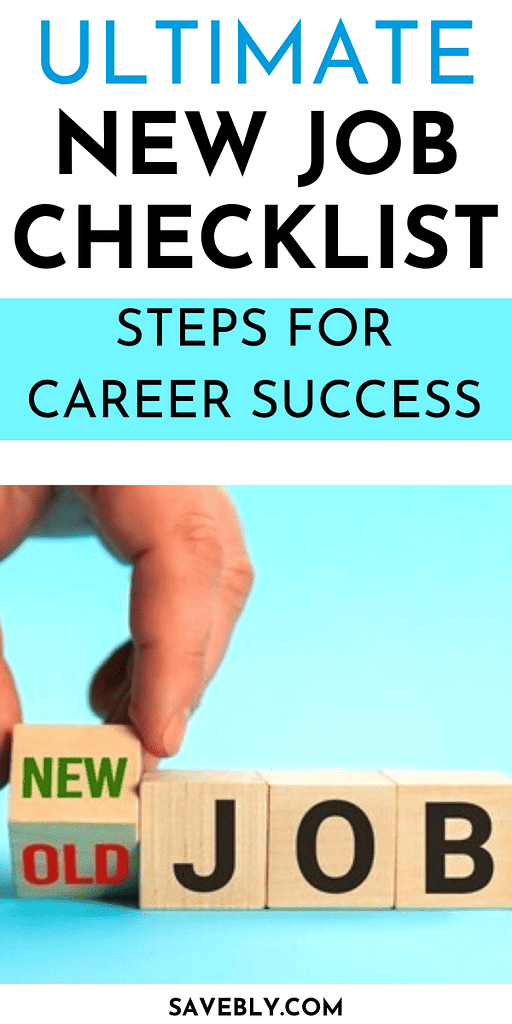Ultimate New Job Checklist (Steps for Career Success)
Starting a new job can be both exciting and overwhelming. To ensure a smooth transition and set yourself up for success, it’s essential to follow a new job checklist to set yourself up for success.
This comprehensive new job checklist covers everything from preparation before your first day to onboarding and building relationships with your new colleagues.
When you start a new job, you need to make sure you have all your ducks in a row to excel in the new company and make a name for yourself.
Landing the job is just the first part; now, you must show what you are worth to land raises, bonuses, and promotions!
Now, let’s get straight into this new job checklist…
Key Takeaways
- Use this new job checklist to navigate your transition with confidence.
- Prepare by researching the company, its culture, and major competitors.
- Plan your commute to avoid being late on your first day.
- Dress professionally and comfortably according to the company’s dress code.
- Pack your bag with essential items for your first day.
- Set an alarm and practice self-care techniques to start your day right.
- Arrive early, introduce yourself, and make an excellent first impression.
Research the Company

Before your first day at your new job, it’s essential to research the company you’ll be joining.
You can better align yourself with the company’s mission and goals by gaining a deeper understanding of the organization, its culture, and its core values. Additionally, researching major competitors can provide valuable insights into the industry landscape and help you understand the company’s position in the market.
To conduct thorough research, start by exploring the company’s website. Take the time to read the “about” section, which often contains information about the company’s history, mission, and vision.
This will give you an idea of the company’s values and what it stands for. Additionally, check out the company’s presence on social media platforms like Twitter and LinkedIn. This can provide valuable insights into the company’s culture, recent news, and updates.
I also recommend checking out Glassdoor, which provides an excellent company overview and has beneficial employee reviews.
These employee reviews of the company will provide you with a lot of helpful information on how the company operates and the pros and cons of the company as a whole.
By researching the company, you’ll be well-prepared to contribute effectively and demonstrate your interest and commitment from day one. It will also help you confidently navigate conversations and interactions with your new colleagues and supervisors.
Researching the company is the first step in this new job checklist since it will help you understand its core values, culture, and major competitors. This knowledge will demonstrate your interest and commitment and help you align yourself with the organization’s mission and goals.
Plan Your Commute

Planning your commute is a crucial step in this new job checklist. By taking the time to plan, you can ensure a smooth and stress-free journey to work.
The last thing you want to do is to constantly show up to your new job late!
Here are some steps to help you plan your commute effectively:
1. Research Transportation Options
Consider the different transportation options, such as driving, public transportation, or biking.
Research the routes, schedules, and costs associated with each option. This will help you determine the most convenient and efficient way to get to your new workplace.
2. Check Traffic Patterns
Use tools like Google Maps to check traffic patterns during commuting hours.
This will help you estimate the time to reach your destination and identify potential bottlenecks or alternative routes to avoid congestion.
3. Utilize Public Transportation
If you opt for public transportation, familiarize yourself with the schedules and routes of buses, trains, or subways you will be using. Make a note of any transfer points or connections you may need to make along the way.
4. Consider Walkability
If your workplace is within walking distance, consider the walkability score of the area. Tools like Walk Score can help you assess the pedestrian-friendliness of the neighborhood, taking into account factors such as sidewalks, proximity to amenities, and overall safety.
By carefully planning your commute and considering factors like traffic, public transportation options, and walkability, you can start your new job confidently, knowing you’ll arrive on time and ready to take on the day.
| Transportation Option | Pros | Cons |
|---|---|---|
| Driving | Flexibility, convenience | Traffic, parking expenses |
| Public Transportation | Cost-effective, environmentally friendly | Schedule restrictions, potential delays |
| Biking | Exercise, no transportation costs | Weather conditions, limited carrying capacity |
| Walking | Health benefits, no transportation costs | Distance limitations, weather conditions |
Dress Professionally and Comfortably

Continuing this new job checklist, it’s essential to dress appropriately to make a good impression when starting a new job.
Please familiarize yourself with the company’s dress code and adhere to it. Ensure you understand the expectations, whether it’s business professional, business casual, or a specific uniform.
Dressing professionally shows respect for the company and your colleagues, and it helps you feel more confident in your new role.
While following the dress code, it’s also essential to prioritize your comfort. Choose clothing that allows you to move freely and feel at ease throughout the day.
Pay attention to the weather and select suitable fabrics for the season. Dressing comfortably will help you focus on your work without distractions or discomfort.
Review the company’s code of conduct to better understand appropriate attire. This resource can guide you on the clothing items, colors, and accessories that align with the company’s brand and culture.
Additionally, observe your new colleagues’ attire during your first few days. They can serve as role models and provide insights into the company’s dress expectations.
Dress Code Guidelines
| Dress Code Level | Attire Examples |
|---|---|
| Business Professional | Suit and tie, dress shirt, dress pants, or skirt |
| Business Casual | Dress shirt or blouse, slacks or khakis, dress shoes |
| Casual | Polo shirt, jeans or casual pants, sneakers |
Dressing professionally creates a positive image and shows that you take your new job seriously. Finding the right balance between adhering to the dress code and feeling comfortable in what you wear is crucial.
Remember, dressing professionally and comfortably reflects your professionalism and allows you to focus on your work and make a positive impression on your new colleagues.
By understanding and following the dress code, you’ll quickly adapt to the company’s culture and fit in seamlessly with your new team.
Pack Your Bag

Packing your bag with the essentials is crucial for a smooth and organized first day at your new job.
Simply put, you want to be prepared for your first day, so we’ll review a few items you’ll need to bring on your first day or daily.
Here’s a packing list to ensure you have everything you need:
- Documents: Bring any necessary documents, such as your identification, social security card, and any paperwork requested by your employer.
- Notepad and Pen: Carry a notepad and pen to take notes during meetings, training sessions, or any vital information you need to remember.
- Lunch: Make it a habit to pack lunch every day, or at least four days out of five, where on that one day, you can buy lunch with co-workers. This means you will always have a nutritious lunch and save a lot of money.
- Water Bottle: Staying hydrated is essential, so bring a water bottle to refresh yourself throughout the day.
- Other Essentials: Depending on your job or company, you may need to include additional items. For example, if you work with technology, bring your laptop or necessary tools.
By preparing these essentials in advance, you’ll feel confident and well-equipped for your first day. Double-check your packing list to ensure you haven’t forgotten anything essential.
Here’s an example of a complete packing list:
| Documents | Notepad and Pen | Lunch | Water Bottle | Other Essentials |
|---|---|---|---|---|
| Identification | Notebook | Sandwich | Reusable water bottle | Laptop |
| Social Security Card | Pen | Fruits | Toolbox | |
| Employment contract | Granola bar |
Having everything you need ready in your bag will allow you to focus on the tasks at hand and make a positive impression on your first day on the job.
Set an Alarm and Practice Self-Care

Preparing for your first day at a new job involves more than just logistics and planning.
Taking care of yourself mentally and physically is also essential to ensure you start the day with a positive mindset.
Setting an alarm to wake up on time is crucial, but it’s equally important to incorporate self-care practices into your morning routine. These practices can help alleviate stress and promote a sense of calm as you embark on this new career chapter.
One effective way to start your day is by practicing deep breathing exercises. Deep breathing can help reduce anxiety, lower blood pressure, and increase relaxation.
Find a quiet space to sit comfortably and take slow, deep breaths, inhaling through your nose and exhaling through your mouth. Focus on the breath entering and leaving your body, and allow yourself to let go of any tension or worries.
Regular exercise is another powerful self-care tool. Physical activity before workday can boost your energy levels, improve your mood, and enhance your overall well-being.
Whether going for a brisk walk, doing a quick workout, or practicing yoga, finding an exercise routine that works for you can positively impact your mental and physical health. Additionally, morning exercise can help you feel more alert and focused throughout the day.
Benefits of Morning Self-Care
Taking care of yourself in the morning allows you to enter your new job with a clear mind and a sense of inner calm. It sets the tone for the day and helps you handle any challenges better.
Remember, taking care of yourself should be a priority, especially during times of change and adjustment. Incorporating self-care practices into your morning routine can help you better navigate the excitement and potential stress of starting a new job, allowing you to bring your best self to the workplace.
| Alarm Clock Tips | Self-Care Ideas |
|---|---|
|
|
Arrive Early and Introduce Yourself

One of the critical factors in making an excellent first impression at your new job is punctuality.
Arriving early shows that you value your time and the company’s time and lets you get settled and comfortable before your official start time.
Aim to arrive at least 30 minutes early and use this time to familiarize yourself with your surroundings, find your workspace, and gather any necessary materials for the day.
Once you’ve arrived early, take the initiative to introduce yourself to your new colleagues.
This is a great way to start building relationships and showing enthusiasm for team participation. Engage in icebreaker activities or casual conversations to ease nervousness and make a positive impression.
Remember to be friendly, approachable, and attentive when meeting new people, and don’t forget to smile!
Introducing yourself to your new coworkers is crucial for establishing a positive rapport and sets the foundation for effective collaboration and teamwork in the future.
By taking the first step to introduce yourself, you demonstrate your willingness to be an active participant in the workplace and create a welcoming atmosphere for everyone.
Remember, likability is a big part of getting ahead in a corporate environment! The more people that know you and like you, the better your chance of getting a raise or promotion!
Icebreaker Activity Ideas
- Ask about their favorite hobbies or interests
- Share a fun fact about yourself
- Discuss a current event or industry news topic
- Ask for recommendations on local restaurants or attractions
| Benefits of Arriving Early and Introducing Yourself |
|---|
| 1. Demonstrates punctuality and professionalism |
| 2. Allows time to settle in and prepare for the day |
| 3. Builds relationships and establishes a positive first impression |
| 4. Encourages collaboration and teamwork |
| 5. Sets the tone for a successful and productive work environment |
I know this can be hard if you are generally a more private/introverted person, but do your best to develop good relationships with your co-workers on day one, and you’ll soon see that this is one of the most critical steps in this new job checklist and that it will make work more fun.
Get to Know Your Team

Building good relationships with coworkers fosters teamwork, collaboration, and a positive work environment.
Take the time to get to know your team members, including those outside your department. Engage in casual conversations, ask questions, and show a genuine interest in their work and personal interests.
By establishing connections and building rapport, you’ll enhance collaboration and create a sense of camaraderie within the team.
Building relationships through teamwork
Effective teamwork is one of the foundations of this new job checklist; getting to know your team personally can significantly strengthen these working relationships.
When you engage in casual conversations, you’ll discover common interests, hobbies, and experiences, which can lead to deeper connections and mutual understanding. This level of familiarity can enhance communication and lead to better collaboration on projects or tasks.
“Teamwork is the ability to work together toward a common vision, and the ability to direct individual accomplishments toward organizational objectives. It is the fuel that allows common people to attain uncommon results.” – Andrew Carnegie
Cultivating a positive work environment
Knowing your team members personally helps create a positive and supportive work environment. When you show genuine interest in your colleagues’ lives and achievements, it fosters a sense of belonging and encourages open communication.
This positive work culture can increase employee satisfaction, motivation, and productivity.
Embracing casual conversations for team bonding
Take advantage of casual conversations to foster team bonding. These informal interactions provide opportunities to share ideas, brainstorm, and discuss work-related challenges in a relaxed setting.
By cultivating an environment where everyone feels comfortable sharing their thoughts and opinions, you’ll create a team that thrives on collaboration and innovation.
Stay Calm and Ask for Help

Starting a new job can be an exciting but nerve-wracking experience. It’s natural to feel some first-day nerves, but staying calm and remembering that everyone goes through a learning curve is essential.
Managing stress on your first day is crucial for a successful transition. Do your best to stay calm when you get stressed, and don’t be afraid to ask for help when you get stuck.
Here are some new job checklist tips to help you navigate challenges and ask for assistance when needed.
1. Explore Stress Management Techniques
You may encounter situations that cause stress or anxiety during your first day. It’s crucial to have effective stress management techniques in place to help you cope.
Take a few deep breaths when you start feeling overwhelmed. Practice mindfulness and focus on the present moment. Find a calming activity that works for you, whether going for a walk, listening to music, or taking short breaks to recharge.
2. Don’t Hesitate to Ask for Assistance
If you find yourself struggling or unsure about something, don’t hesitate to ask for help. Your colleagues and hiring manager are there to support you and want to see you succeed.
Reach out to them when you need clarification or guidance. It’s better to ask questions and seek assistance than to make assumptions that could lead to mistakes. Remember, asking for help when starting a new job is expected.
3. Schedule a Meeting with Your Hiring Manager
If you have specific questions or concerns that you would like to address, consider scheduling a meeting with your hiring manager. This can be an opportunity to discuss your expectations, ask for clarification on your role, or seek guidance on navigating certain situations.
Building a rapport with your manager early on can help set clear expectations and foster a supportive relationship.
Asking for help is not a sign of weakness but rather a strength. It shows that you’re eager to learn and grow.
Remember, your first day on the job is just the beginning. Stay positive, stay calm, and be open to learning. Each experience, whether positive or challenging, is an opportunity for personal and professional growth. Embrace the journey, and don’t forget to celebrate your achievements.
| Stress Management Techniques | Benefits |
|---|---|
| Deep breathing exercises | It calms the mind and reduces stress levels |
| Listening to music | It provides relaxation and uplifts your mood |
| Taking short breaks | Allows time for rest and rejuvenation |
| Going for a walk | Helps clear the mind and improves focus |
Conclusion
This new job checklist will set you up for success in your new company!
This checklist has provided the tools and guidance to transition into your new role, allowing you to hit the ground running and make a positive impression.
As you continue your career journey, remember the importance of professional growth. Please take advantage of the opportunities that come your way, whether attending training sessions, participating in company-wide projects, or seeking mentorship from experienced colleagues.
By continually learning and expanding your skill set, you’ll position yourself for long-term success.
Remember, the first week on the job is just the beginning. Stay proactive, remain open to learning, and maintain a positive attitude. Doing so will create a solid foundation for a rewarding and fulfilling career.
If you like this post, I recommend checking out my posts on How To Respond To A Pay Cut (What To Do Right Now) and 21 Jobs That Don’t Suck – Make Money & Be Happy.
Do you have anything to add to this new job checklist? What are your thoughts? Let me know in the comments below!






